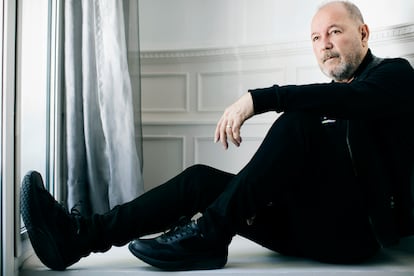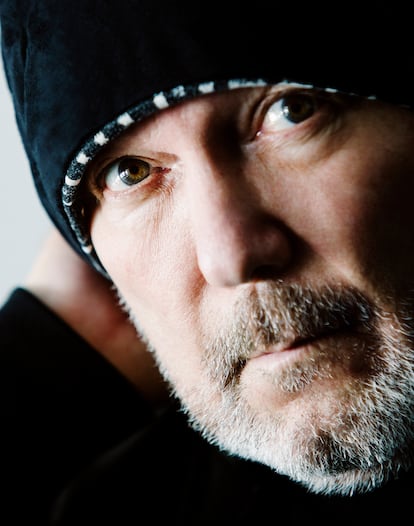Rubén Blades: ‘How long is Latin America going to keep blaming the gringos?’
The musician, actor, lawyer and social activist never fails to surprise – or to have an opinion. The multi-talented Panamanian, now 72, talked to EL PAÍS as he prepares the memoirs of an extraordinary life

Rubén Blades is working on his memoirs, among other things because he was told to by Gabriel García Márquez. But it doesn’t feel much like his career is over. He will soon reappear as Daniel Salazar in the seventh season of Fear The Walking Dead, and he continues to make music, with his last album, Salswing, released in April. On the day that he talked with EL PAÍS in Madrid, he had just accepted Spain’s Gold Medal for Merit in the Fine Arts, and wanted to go for a walk in the Spanish capital before heading back to the US. The Latin music legend talked politics, colonialism, music, family and the law.
Question. You thought about running in Panama’s 2019 elections, but you didn’t in the end. What happened?
Answer. It didn’t seem viable to me. There are things I don’t understand, as the traditional political parties in Panama have demonstrated an overwhelming level of corruption and mediocrity. I don’t understand why people join them. We are a country of four million people and a very high percentage of people are members of political parties, which for me is the root of the problem. I didn’t see myself getting the votes. The risk is different now from when I ran in 1994 [his first presidential bid]. People do not believe in anyone. Pablo Pueblo, the character in my song, appears as a man who perceives the changes happening. If you are going to participate in the democratic process, you need support so you don’t govern alone. You need patience to see that the process of change is not immediate, but generational. And now we don’t have that patience.
Q. You talk about Pablo Pueblo and it reminds me how Nicolás Maduro, in Venezuela, criticized you and said you had left behind the ideals of that song [Maduro said Blades had forgotten where he came from].
A. It’s extraordinary. Look at him and Daniel Ortega in Nicaragua. It is a pity for the left that they are even considered part of the argument. Those two don’t do socialism. Please!
Q. What would you call it?
A. Incompetence. Mediocrity. Tyranny, in reality, even if they want to dress it up as being the law. Suddenly you have a rule saying that only left-handed people will be able to vote and it gets waved through by parliament. Law and justice are not the same thing, as we know. The jurist Hans Kelsen said it when talking about Hitler. Who told you that the law has to be rational?

Q. Rubén Blades the politician, the lawyer and the musician have already appeared early in this interview. Which one of them is more you?
A. I am the son of Anoland [Díaz; real surname Bellido de Luna] and Rubén [Darío Blades, Sr.] It’s how you are raised. My grandmother, my parents, my neighborhood, my teachers... I was nurtured by Panama, whose population reached a million in the 1960s, when I was growing up. There was a sense of community, solidarity and belonging, and that helped me to survive later in New York, with all the diversions and temptations that come along the way. It helped me deal with fame, which is not the place where I live but I where I do visit sometimes and it’s nice. I don’t need it. What made me survive the craziness is what came before.
Q. Would you say you had a healthy upbringing?
A. With my grandmother, for example, who taught me and who was an educated woman in a country where women were only allowed to raise macho men and to know how to cook. She talked to me every day and answered all my questions as a child like she was speaking to a rational person. She explained to me what death was as a funeral procession passed by. After we left the movie theater with the strongest air conditioning in the entire Western hemisphere, and where they served great hot dogs, she said. “I’m going to die, and so will you.”
Q. Well...
A. I once asked her if we were poor. She asked me why I said that, and I replied, ‘Well, because I see that there are things that we don’t have and we can’t buy.’ And she told me. ‘Look, we’re not poor, we just don’t have money.’ And I said. ‘Well, isn’t that the same thing?’ ‘No, it’s not the same thing,’ she told me. ‘Poor is the person who has no intellect or spirit, who is ignorant. An idiot wins the lottery tomorrow and he doesn’t stop being poor because of that. There are people who are poor because all they have is money. Don’t think about that.” What a fucking great lesson! I never forgot those words to live by.
Q. What was your grandmother’s name?
A. Emma Bosque Aizpuru. And my great-grandmother, Adela Aizpuru Aizpuru, a woman who I never saw smile. If she did, she did it alone. She actively avoided hugs.
Q. So you went to New York with that armor.
A. I left because my father had a problem with Noriega in 1973. I finished my studies and left. The myth that exists in Panama is that I finished my studies to please my mother. and that’s not the case. People who say that do not know what it’s like to study five years of law with professors like Camilo Pérez, a sadist who would set an exam for 175 students and would only pass eight. No one would go through that just to please their dear mother. And I passed! If my father had not had a problem in Panama, who knows if I would have been a musician or an actor, or if we would be talking here now. But I did not want to practise [law] in a country ruled by a tyrant.
Q. One in a long line of dictators in Latin America.
A. And the majority triumph because of something they all have in common.
Q. What’s that?
A. The indifference of their own people.
Q. More so than imperialism or the inheritance of authoritarian ideas?
A. No, no, no, no, no. Indifference is the problem. In Panama, Noriega could not have had the power he had with 15,000 guards. You gather 100,000 people and those guys run away. Some are going to die, all right. Why? Because that’s what happens. Dictatorships happen and are perpetuated by the tacit support of the people. There are countries lost to corruption with parliaments full of deputies that we have voted to be there. Whose fault is that? The gringos? How long are we going to keep blaming either them or colonialism in Latin America? In 1989, Noriega fell and in 31 years we have had more corruption from civilian power than ever before. Tell me, whose fault is that?

Q. In your career you have revolutionized salsa by giving it a social conscience. Do you think it has made a difference?
A. I am an optimist. I don’t believe that the universe was created for evil. There is too much beauty in a flower, or a bird’s colors, to believe that all this is going to be taken away by the devil. I don’t see it. It is true that the problem we have now is society’s extremes. There are people who believe that there have been no changes, and that is completely false. Little by little. If you told me in 1974 that I would see a black man as president of the United States...
Q. Who was followed by a white man straight out of a nightmare.
A. Democracy is not infallible. No one imagined that idiot Trump was going to win. But we all live in bubbles that prevent us from seeing reality. Many people felt marginalized by an elite and that guy was elected by people who were enraged.
Q. And they did that without realizing they were voting for that same elite that really oppresses them?
A. That is populism, the same old story.
Q. When you arrived in the United States in 1974, did you really not dream of making a living as a musician?
A. No, I really didn’t. I went to Miami, where my parents were. My main concern was to find work to help my family. In the middle of everything, since I had some contact with La Fania [music label] thanks to an album I had recorded in Panama, I called to offer my services as a songwriter and they said no. They could only offer one position, in the mailroom, sending out records. They paid $125 a week and that was better than nothing. That’s how I came to La Fania....
Q. Yeah, but then you became their king.
A. Well, I had my guitar, but I was sure that it would not be possible for me to find work as a singer. My main concern was to send the money to my mother – that’s what mattered to me. I paid $100 for the room, sent her $200 and had the rest for expenses.
Q. What did you eat?
A. Whatever I could find. But I didn’t feel poor, I walked instead of taking the subway, as that way I saved $21 a month. I never learned to drive, I never wanted a car, I drive on movie shoots and my friends die laughing. I don’t believe in luck, but in opportunity, and fortune arrived at the right time. Ray Barretto’s band broke up, Tito Allen left and I was given an opportunity. Hey, the guy who’s in the mailroom sings and writes... They tried me out on a couple of things and they chose me. But I didn’t quit the mailroom. With music I still couldn’t make a living. The pay was very bad. If there was work, I earned about $35. Monkeys don’t let go of the branch until they have another one in their hand... Then, two years later, Willie Colón came along.
Q. Were you already writing lyrics with a strong social message by then?
A. Pablo Pueblo is from 1968. I was already into that. As García Márquez used to say to me, ‘You are a chronicler of history.’ What I do is short stories. Everything comes from Jongo Trio and his songs like Terra de ninguém... Or from Chico Buarque with A banda, or Piero in Argentina. With those influences I was already writing these chronicles.
Q. What was your relationship with García Márquez?
A. I had read Leaf Storm and Story of a Shipwrecked Sailor, which I told him was the best thing he had written in his life. We met before he won the Nobel Prize and we spoke frequently. Once I was told that he would have liked to have written Pedro Navaja [Blades’ salsa song from 1978]. I dismissed it until someone confirmed it.
Q. Some people think that your music was sacrilegious for forcing people to stop dancing and to listen to the lyrics.
A. Many believe that salsa should stay out of politics and all that, but the one who said it best on what musicians should do in that regard was Pau Casals, the cellist. He believed that the negative effects of bad politics have consequences on artists. There are a lot of people who hate you for that. There is a certain percentage of humanity that is against you for trying to do something for the first time.
Q. Is Fear The Walking Dead escapism?
A. It’s escapism that makes you think, and more so now with the pandemic. It raises the question of what we would do if normality disappeared... what the world would be like. And look what has happened with Covid. The only ones who would survive an apocalypse right now are the Cubans, who have been living through a disaster for decades.
Q. What do you think about reggaeton?
A. Well, as in everything, there are some very good people. René [Residente], for example, is not only good, he will last. Everything he does is extraordinary because he gives great importance to the lyrics. Reggaeton artists are interested in salsa as an influence, and I know that because I meet them at my concerts with their parents, like Bad Bunny. If I did a song with that guy and it became a hit, I’d pay off my mortgage!
Q. And you’re writing a memoir?
A. Yes, including how to pronounce my last name, Blades, the way my grandfather liked it [Blah-dess], and not like in English. Or how my first name has an accent on the ‘e’ and not on the ‘u,’ as Michael Jackson used to say to me. He was a very professional guy and I wrote him a song that he sang very well, yes sir, but when he asked me to make a whole record for him I told him I didn’t have the time. ‘Rubén,’ he said to me, ‘come to Australia.’ And I said, ‘Do you know how many things I have to do?’ Also how I got into movies and how I approach singing.
Q. And when you write, you do it as a chronicler?
A. Completely, as a journalist describing facts. As a devotee of Gabo [García Marquéz], who never looked down on the work we did.
Q. And far away from poetry too?
A. No, there must be some poetry, but without trying to be a poet.
